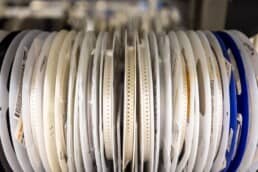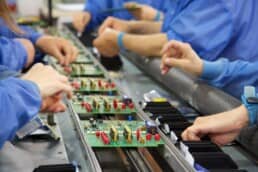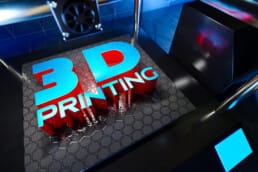Questions to Ask When Outsourcing to a Contract Manufacturer
Believe it or not, most companies don’t get into the business to specialize in manufacturing. Managing manufacturing processes may significantly drain their time and resources. From sourcing raw materials to maintaining production equipment, there are many moving parts involved. This draws focus away from what they really care about: providing a product and service to their customers.
All of these processes can quickly become overwhelming, and outsourcing to a contract manufacturer is an attractive solution. Outsourcing allows companies to focus on core business activities like product development, marketing and sales.
However, outsourcing also comes with its challenges. Companies looking to outsource need to find the right partner to ensure their quality standards are met. The decision can be overwhelming, but don’t worry! RiverSide Integrated Solutions (RIS) is here to help. We have created a comprehensive guide to help you navigate the selection process effectively.
1. What is their core competency?
Most companies consider the type of products the contract manufacturer specializes in when searching for a partner who fits their needs. However, it’s also crucial to understand the contractor’s areas of expertise and industry experience.
At RIS, we are a good fit for companies focused on printed circuit board assembly (PCBA) and product assembly. Just as crucial, though, is our dedication to delivering high-quality solutions for ruggedized electronics. Our customers need a contract manufacturer that can create products that work in every environment.
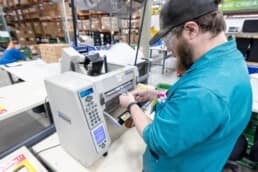
2. Can they meet our requirements?
Every project has unique requirements, so companies must collaborate with a contract manufacturer that can meet them. Inquire about their capabilities, production capacity, lead times and flexibility to accommodate your needs.
RIS offers flexible manufacturing solutions tailored to your specific requirements, ensuring efficient production and timely delivery.
3. What quality control measures do they follow?
Quality is paramount in manufacturing. When vetting potential partners, you need to ensure they maintain rigorous quality control standards. Ask about their quality management systems, certifications and processes for ensuring product quality and consistency.
We’re ISO-certified and adhere to strict quality control measures throughout the manufacturing process at RIS. This helps us ensure that every product meets the highest standards of excellence.
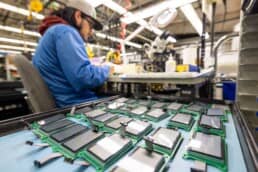
4. How do they handle supply chain management?
Efficient supply chain management is critical for seamless production processes. Ask about the contract manufacturer’s supply chain management capabilities, including component sourcing, inventory management, and logistics.
You want to ensure the smooth flow of materials and timely delivery of components. At RIS, we’ve established relationships with trusted suppliers over 40 years in the industry. Our robust supply chain management practices ensure that our customers get the service they need.
5. What value-added services do they offer?
In addition to manufacturing, contract manufacturers may offer additional value-added services to enhance production. Ask about kitting, product testing, fulfillment, and reverse logistics.
At RIS, we provide a comprehensive suite of integrated solutions. These help streamline your manufacturing experience and add value at every stage.
6. Can they support our long-term goals?
Partnering with a contract manufacturer is a long-term commitment. It could prove disastrous down the line if you don’t ensure alignment with your business goals and objectives upfront. Inquire about a contract manufacturer’s commitment to innovation, continuous improvement and support for your long-term growth strategies.
At RIS, we have fostered long-term partnerships with our clients. We support their growth and success through innovative solutions and exceptional service.
Outsourcing to a contract manufacturer can offer numerous benefits, but choosing the right partner requires careful consideration. It is essential to ask the right questions. Address key concerns such as core competency, capabilities, quality control, supply chain management, value-added services and long-term support. Only then can you make an informed decision that aligns with your business objectives.
At RIS, we are committed to delivering excellence in contract manufacturing and providing the solutions you need to succeed. Contact us today to learn more about how we can support your manufacturing needs.
About RiverSide Integrated Solutions
RIS is an advanced contract manufacturer providing robust solutions in circuit board assembly and product assembly. We employ more than 350 people and provide services to OEMs worldwide. We operate two state-of-the-art manufacturing facilities within the US.
With all of the choices in contract manufacturers out there, we know it can be challenging to find someone who understands your business model and has your best intentions in mind. RIS has always proven to be a win-win-focused relationship.
As your one-stop shop, we have the capabilities, capacity, quality assurance standards and resources to support all of your manufacturing needs. We understand that supply chain management is complex and very time-consuming, so we urge our customers to utilize us in the fullest capacity.
Our total-package solutions include:
- Extensive supply-chain network
- Full box-build assembly
- Dedicated Program Team
- Warehousing, kitting and drop-shipping capabilities
- Reverse logistics
- Flexible order fulfillment
- Scalability to meet your needs
Contact us today at (507) 523-3220 to see how we can help with your manufacturing project, or click contact us for a quote.
40 Years of RiverSide: How Electronics Manufacturing Has Evolved
In our world. technological progress is often measured in leaps and bounds. To this end, the electronics manufacturing industry stands as a testament to relentless innovation and adaptation. Over the past four decades, this industry has undergone remarkable transformations. Most of these transformations have been driven by advancements in technology. They’ve also been affected by changing market dynamics and evolving consumer demands.
For the past 40 years, RiverSide Integrated Solutions (RIS) has been at the forefront of the electronics manufacturing industry. In honor of the company’s anniversary, Steve Craney, founding member and owner of RIS, delved into how things have changed.
FROM SWAGED LEADS TO SURFACE MOUNT TECHNOLOGY
The journey begins in the early 1980s, where electronics manufacturing was characterized by the use of through-hole (TH) technology. Devices were constructed by placing components on the board with leads that passed through the circuit board. Original equipment manufacturers (OEMs) often
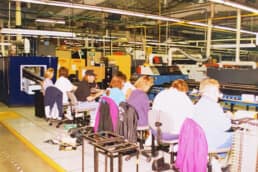
still required swaged ends for stability, despite emerging evidence that soldering alone was reliable.
Swaging is a process involved in TH printed circuit board assembly (PCBA). In this process, component leads are either cut with a flat end or bent over and cut before soldering. The swaged end keeps the component from going back through the hole even if the solder fails. Because of the complexity of this process, skilled technicians were required to meticulously cut and solder components into place.
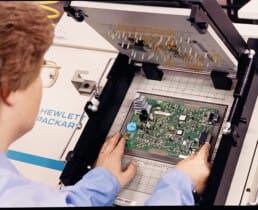
Steve Craney recalls transitioning from TH boards to surface mount technology (SMT) as a pivotal moment. “They were just getting away from [swaged leads] when we started this business. Some people wanted swaged leads; some people didn’t care, as long as they were soldered.”
SMT revolutionized the manufacturing process by allowing components to be mounted directly onto the surface of the circuit board. This eliminated the need for leads to pass through the board. This shift improved assembly efficiency and enabled the production of smaller and more compact electronic devices.
QUALITY CONTROL AND TESTING
Another significant change observed in electronics manufacturing was the evolution of quality control and testing methodologies. In the early days,
burn-in processes were commonplace. In this practice, newly manufactured devices were subjected to extended periods of operation to identify potential failures. However, advancements in testing equipment and techniques led to the adoption of more efficient testing protocols. Steve Craney remarked, “A good functional test, or a good test where you have power on it for 5 to 10 minutes, is just as good.”
Industry leaders implemented functional testing as an alternative to burn-in procedures, marking a paradigm shift in the industry. Functional testing focuses on assessing device performance under real-world conditions within shorter timeframes. This streamlines the manufacturing process and reduces costs associated with prolonged testing periods.
AUTOMATION AND ROBOTICS
The integration of automation and robotics played a crucial role in enhancing manufacturing efficiency and precision. In the mid-1990s, the introduction of advanced assembly machines revolutionized production lines with their robust construction and high-speed capabilities. These machines, characterized by their solid steel frames and precise movement mechanisms, set new standards for reliability and productivity in electronics manufacturing.
Furthermore, the innovations of companies like United Shoe and Universal, who created breakthrough technology for auto-insertion, further propelled the automation trend. These advancements not only accelerated production rates but also ensured consistent quality across manufacturing processes.
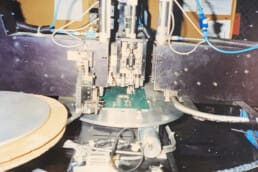
CHALLENGES AND OPPORTUNITIES
While technological advancements have propelled the electronics manufacturing industry forward, they have also presented unique challenges and opportunities. The rise of offshore manufacturing and intense global competition has exerted pressure on margins. This has driven the need for greater operational efficiency and cost-effectiveness.
However, amidst these challenges, opportunities abound for companies that embrace innovation and adaptability. Steve Craney emphasizes that importance of staying ahead of technological breakthroughs, particularly in the era of artificial intelligence (AI). He states that, “The company that can stay very innovative will win in this battle . . . that’s the weakness of AI.”
AI holds the potential to revolutionize various aspects of manufacturing. These include process optimization and predictive maintenance. However, its implementation requires a strategic approach that balances the strengths of AI with the innovative capabilities of humans.
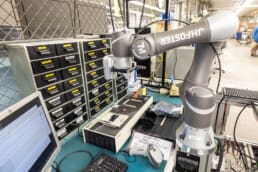
LOOKING TOWARDS THE FUTURE
As the industry continues to evolve, the key to sustained success lies in fostering a culture of innovation and collaboration. With a dedicated team of professionals committed to staying abreast of emerging technologies, RIS is poised to navigate the ever-changing landscape of electronics manufacturing.
The past four decades have witnessed remarkable transformations in the electronics manufacturing industry. As we look towards the future, the journey of electronics manufacturing promises innovation, adaptation and endless possibilities.
About RiverSide Integrated Solutions
RIS is an advanced contract manufacturer providing robust solutions in circuit board assembly and product assembly. We employ more than 350 people and provide services to OEMs worldwide. We operate two state-of-the-art manufacturing facilities within the US.
With all of the choices in contract manufacturers out there, we know it can be challenging to find someone who understands your business model and has your best intentions in mind. RIS has always proven to be a win-win-focused relationship.
As your one-stop shop, we have the capabilities, capacity, quality assurance standards and resources to support all of your manufacturing needs. We understand that supply chain management is complex and very time-consuming, so we urge our customers to utilize us in the fullest capacity.
Our total-package solutions include:
- Extensive supply-chain network
- Full box-build assembly
- Dedicated Program Team
- Warehousing, kitting and drop-shipping capabilities
- Reverse logistics
- Flexible order fulfillment
- Scalability to meet your needs
Contact us today at (507) 523-3220 to see how we can help with your manufacturing project, or click contact us for a quote.
Unlocking Cost Savings: The Power of One-Stop-Shop Contract Manufacturing with RIS
Drawing insights from industry trends we can see several indicators for the manufacturing landscape in 2024. Economic uncertainty, supply chain disruptions, sustainability pressures and the need for product innovation mark it. Further, DIY automation is emerging as a key trend, making automation more accessible and cost-effective for businesses of all sizes.
In this landscape, Original Equipment Manufacturers (OEMs) face an uphill battle to remain competitive. As the demand for sustainability and ethical sourcing rises, costs associated with manufacturing processes are escalating. In this scenario, OEMs must explore innovative strategies to cut costs without compromising quality or efficiency.
It’s only natural in situations like this that companies look to partner with outside help to relieve some of this burden. This is where RiverSide Integrated Solutions (RIS), a full-service contract manufacturing company, steps in as a game-changer. But first, let’s look at some issues in greater detail.
RISING COSTS AND COMPLEXITIES
As we ring in 2024, the manufacturing industry grapples issues from many different directions. These include economic uncertainty, skilled labor shortages, targeted supply chain disruptions and the imperative for innovations to meet net-zero emissions goals. In this scenario, costs are rising upward, driven by several factors.
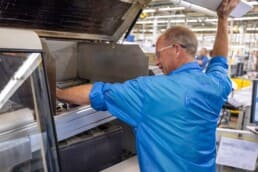
TECHNOLOGICAL ADVANCEMENTS
Staying current with machinery and new technology is crucial for remaining competitive. However, the costs of adopting and integrating new technologies into manufacturing processes continue to rise. It isn’t feasible for OEMs to invest in every piece of new technology.
OPERATIONAL EXPENSES
Day-to-day operational costs, including utilities, maintenance and labor, are rising, putting additional strain on budgets. If OEMs want to stay in the game, they must streamline operating costs and increase efficiency.
SPACE RENTAL RATES
OEMs that want to do all of their manufacturing in-house need to continue to add space as they grow. And as the demand for manufacturing space increases, facility rental rates are escalating. This creates further financial burden.
LABOR COSTS
Every new technological innovation brings new heights in what technology and manufacturing can achieve but also requires more skill. And with skilled labor in high demand, salaries and wages are ever-increasing. This adds to the overall cost of production.
SOURCING CHALLENGES
An OEM might negotiate a specific price for a part with a procurement agency. But what happens when that part isn’t available? Or if the agency they work with raises its prices? Sourcing for parts and alternative components has become more complex, driven by global economic shifts and supply chain disruptions. This puts more strain on OEMs’ work to bring parts in internally.
In such a challenging environment, OEMs must devise strategies to contain costs and streamline their operations for maximum efficiency.
THE IMPERATIVE OF REMAINING COMPETITIVE
To thrive in this challenging environment, OEMs must find innovative ways to reduce costs while maintaining quality and efficiency. One powerful solution is to leverage the services of a full-service contract manufacturer like RiverSide Integrated Solutions (RIS).
Contract manufacturers partner with multiple OEMs to produce their products, gaining experience in many different areas along the way. At RIS, we offer 40 years of experience in the manufacturing industry. Years of experience that we use to help our customers reach success. When it
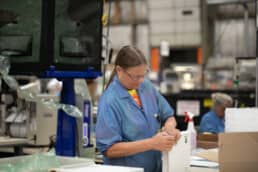
comes to rising costs and complexities, we have the skills to help OEMs achieve maximum efficiency.
HOW RIS CAN HELP
BUNDLE AND SAVE
We offer a one-stop-shop advantage. At RIS, we aren’t limited to just manufacturing or subassembly. We can manage the entire process from part procurement to final customer delivery. This consolidation eliminates the need for multiple suppliers, saving money and labor on the overall process.
PURCHASING POWER
Our bulk purchasing power allows us to acquire parts in large quantities. Because we buy for multiple clients at once, we gain cost savings that we pass on to our customers.
EXPERTISE AND KNOWLEDGE
Contract manufacturers, by focusing intensively on procurement, assembly, testing, and training, amass a wealth of technical knowledge. This knowledge is then applied strategically to the advantage of each customer, resulting in optimized processes and product quality.
At RIS, we’ve been doing what we do for 40 years! We have the know-how and the skills to keep your manufacturing operations on track!
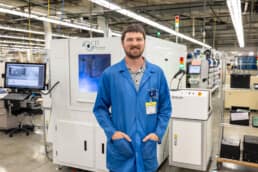
INVESTMENT IN TECHNOLOGY
By spreading capital and operational expenses across multiple clients, we maximize the use of technological and functional upgrades. This ensures optimal efficiency, quality and automation, translating to cost savings for the OEMs.
DESIGN OPTIMIZATION
We collaborate with OEMs to identify improvements in design for manufacturability and assembly. This proactive approach minimizes rework waste during the product and assembly, optimizing efficiency.
A PARTNER FOR SUCCESS
In the face of escalating challenges, OEMs partnering with contract manufacturers like RIS find a strategic advantage. RIS offers cost-effective solutions and operational efficiencies that are crucial for success in today’s competitive landscape. We do this through our comprehensive approach and by leveraging the collective strength of a diverse customer base,
The key to unlocking cost efficiency in manufacturing lies in strategic collaborations with full-service contract manufacturers like RIS. The evolving landscape demands a holistic approach that streamlines operations, optimizes costs and positions OEMs for sustained success.
About RiverSide Integrated Solutions
RIS is an advanced contract manufacturer providing robust solutions in circuit board assembly and product assembly. We employ more than 350 people and provide services to OEMs worldwide. We operate two state-of-the-art manufacturing facilities within the US.
With all of the choices in contract manufacturers out there, we know it can be challenging to find someone who understands your business model and has your best intentions in mind. RIS has always proven to be a win-win-focused relationship.
As your one-stop shop, we have the capabilities, capacity, quality assurance standards and resources to support all of your manufacturing needs. We understand that supply chain management is complex and very time-consuming, so we urge our customers to utilize us in the fullest capacity.
Our total-package solutions include:
- Extensive supply-chain network
- Full box-build assembly
- Dedicated Program Team
- Warehousing, kitting and drop-shipping capabilities
- Reverse logistics
- Flexible order fulfillment
- Scalability to meet your needs
Contact us today at (507) 523-3220 to see how we can help with your manufacturing project, or click contact us for a quote.
Streamline Your Manufacturing Process with Comprehensive Integrated Solutions
At RiverSide Integrated Solutions (RIS), we take great pride in offering a holistic approach to manufacturing through a comprehensive suite of integrated solutions. But what does “integrated solutions” mean? Put simply, it integrates comprehensive services under one roof, removing the need for multiple suppliers in the contract manufacturing process. This consolidation delivers remarkable cost savings.
RIS serves as your one-stop shop, combining our primary printed circuit board and product assembly capabilities with an array of value-added services. By bundling these services, you minimize overhead costs, as RIS becomes your single point of contact for all manufacturing needs.
In this post, we will explore the various facets of our integrated solutions at RIS. These value-added solutions include supply chain management, kitting, product testing, fulfillment & distribution, quality management and reverse logistics.
SUPPLY CHAIN MANAGEMENT:
At RiverSide Integrated Solutions (RIS), we take great pride in offering a holistic approach to manufacturing through a comprehensive suite of integrated solutions. But what does “integrated solutions” mean? Put simply, it integrates comprehensive services under one roof, removing the need for multiple suppliers in the contract manufacturing process. This consolidation delivers remarkable cost savings.
RIS serves as your one-stop shop, combining our primary printed circuit board and product assembly capabilities with an array of value-added services. By bundling these services, you minimize overhead costs, as RIS becomes your single point of contact for all manufacturing needs.
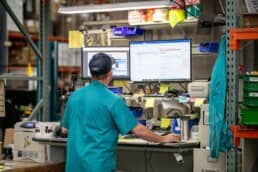
In this post, we will explore the various facets of our integrated solutions at RIS. These value-added solutions include supply chain management, kitting, product testing, fulfillment & distribution, quality management and reverse logistics.
KITTING:
As part of our integrated solutions, we offer kitting services, which involve assembling customized kits or packages of components and materials required for specific products or production processes. Our meticulous organization and packaging of items simplify assembly operations and reduce production time significantly.
With our kitting expertise, you can optimize your assembly process and improve overall operational efficiency, saving valuable time and resources.
PRODUCT TESTING:
At RIS, we prioritize rigorous testing and quality assurance measures to ensure your products meet the highest standards. Our comprehensive testing services include functional testing, performance testing and environmental testing. By subjecting your products to thorough testing, we help enhance customer satisfaction and minimize the risk of product failures, safeguarding your brand reputation.
FULFILLMENT & DISTRIBUTION:
RIS offers comprehensive fulfillment and distribution services, including order processing, packaging and shipping. Our logistics management expertise ensures that your products reach customers efficiently and on schedule, enhancing customer satisfaction and reducing operational complexities.
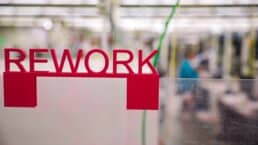
QUALITY MANAGEMENT:
Quality management is a core pillar of RIS’s integrated solutions. Our dedicated team implements robust quality control measures throughout the manufacturing process. We conduct thorough inspections, audits and quality checks to promptly identify and resolve any quality issues. Maintaining strict quality standards, we help safeguard your brand reputation and deliver products that consistently meet or exceed customer expectations.
REVERSE LOGISTICS:
Managing product returns and disposal is a critical aspect of the manufacturing process. RIS offers efficient reverse logistics services, including product returns, repairs, refurbishment and responsible disposal. Our streamlined reverse logistics processes reduce costs, improve customer satisfaction and support environmental sustainability, ensuring a comprehensive and accountable approach to product lifecycle management.
By integrating a comprehensive suite of solutions, ranging from supply chain management and kitting to product testing and beyond, RIS delivers unparalleled benefits to your manufacturing process. Our integrated approach ensures that each aspect of your production is seamlessly orchestrated and tailored to your unique requirements. As a result, we optimize your manufacturing process, elevate product quality, and enhance overall operational efficiency. With our support, you gain a competitive advantage in the market, allowing you to focus on innovation and growth. At the same time, we handle the intricacies of manufacturing, ultimately driving your success to new heights.
OUR INTEGRATED SOLUTIONS IN ACTION
In conclusion, our integrated solutions at RIS embody a commitment to excellence in manufacturing. We understand modern production’s complex and multifaceted nature, so we offer a comprehensive suite of integrated services. These services seamlessly combine to add substantial value to your manufacturing process.
By choosing RIS as your manufacturing partner, you tap into a wealth of experience, cutting-edge processes, and a commitment to excellence that can propel your business to new heights. We orchestrate every aspect of production seamlessly, allowing you to concentrate on innovation and growth. In short, RIS is the best choice for OEMs seeking a partner that understands manufacturing and excels in optimizing it. With RIS by your side, success is not just a goal – it’s an achievable reality.
About RiverSide Integrated Solutions
RIS is an advanced contract manufacturer providing robust solutions in circuit board assembly and product assembly. We employ more than 350 people and provide services to OEMs worldwide. We operate two state-of-the-art manufacturing facilities within the US.
With all of the choices in contract manufacturers out there, we know it can be challenging to find someone who understands your business model and has your best intentions in mind. RIS has always proven to be a win-win-focused relationship.
As your one-stop shop, we have the capabilities, capacity, quality assurance standards and resources to support all of your manufacturing needs. We understand that supply chain management is complex and very time-consuming, so we urge our customers to utilize us in the fullest capacity.
Our total-package solutions include:
- Extensive supply-chain network
- Full box-build assembly
- Dedicated Program Team
- Warehousing, kitting and drop-shipping capabilities
- Reverse logistics
- Flexible order fulfillment
- Scalability to meet your needs
Contact us today at (507) 523-3220 to see how we can help with your manufacturing project, or click contact us for a quote.
Shaping a Greener Future: RIS's Environmental and Sustainability Efforts
CONSERVING ENERGY AND RESOURCES:
As a modern contract manufacturing company, RiverSide Integrated Solutions (RIS) is dedicated to embracing sustainability. Our commitment to responsible resource management and renewable energy solutions sets us apart as a leading corporate citizen.
We actively seek ways to reduce our environmental impact, promote energy efficiency and foster a waste-reduction, recycling-focused culture.
Join us as we explore four ways we make efforts to shape a greener, more sustainable future.
WASTE REDUCTION AND RECYCLING:
At RIS, we emphasize waste reduction and responsible disposal practices. Through our diligent efforts, we seek to achieve a net carbon reduction by reusing materials whenever feasible.
Additionally, we endeavor to see recyclable materials find their way to viable markets. There are plenty of ways to minimize waste going to landfills. We embrace recycling whenever possible and adhere to federal, state and local laws and ordinances. In this way, we are able to actively contribute to the circular economy.
Our commitment to ethical waste management is a testament to our dedication to sustainable practices.

SUSTAINABLE FACILITIES:
RIS is committed to creating sustainable facilities that prioritize environmental well-being. In a recent project at one of our facilities, we transitioned from energy-consuming halide to energy-efficient LED lighting. This switch reduced our energy consumption greatly. Plus, thanks to the brighter, more efficient LEDs, we decreased the number of fixtures required. We plan to implement similar energy-saving initiatives across all our facilities soon.
In another recent project, we replaced consumable paper towels with washable and reusable towels for our cleaning staff. This significantly reduced waste and promoted a cleaner working environment.

COMMUNITY OUTREACH:
Our commitment to environmental and sustainability efforts extends beyond our corporate operations. We believe in giving back to our community and supporting organizations that positively impact our society. Through our Volunteer & Philanthropy Committee, we actively engage with various charitable organizations. Some include Winona Volunteer Services, Habitat for Humanity, the Winona Humane Society, and the Minnesota Adopt a Highway program.
We encourage our employees to participate and make a difference in the community. To facilitate this, we provide all staff with paid Volunteer Time Off. This allows them to volunteer their time during work hours at an organization of their choice.
Our commitment to community outreach aligns with our broader mission of creating a better future for the communities we serve.
A GREENER TOMORROW TOGETHER:
At RIS, we take great pride in being a positive example of environmental and sustainability actions in the corporate landscape. We’re dedicated to positively impacting our planet. This is reflected in our commitment to conserving resources, adopting renewable energy solutions and implementing waste reduction strategies. Moreover, we extend this commitment to our community by engaging with charitable organizations and supporting causes that uplift society.
Our ongoing initiatives and forthcoming projects underscore our resolve to implement responsible business practices. We hope that our example can inspire others toward a greener, more sustainable future.
About RiverSide Integrated Solutions
RIS is an advanced contract manufacturer providing robust solutions in circuit board assembly and product assembly. We employ more than 350 people and provide services to OEMs worldwide. We operate two state-of-the-art manufacturing facilities within the US.
With all of the choices in contract manufacturers out there, we know it can be challenging to find someone who understands your business model and has your best intentions in mind. RIS has always proven to be a win-win-focused relationship.
As your one-stop shop, we have the capabilities, capacity, quality assurance standards and resources to support all of your manufacturing needs. We understand that supply chain management is complex and very time-consuming, so we urge our customers to utilize us in the fullest capacity.
Our total-package solutions include:
- Extensive supply-chain network
- Full box-build assembly
- Dedicated Program Team
- Warehousing, kitting and drop-shipping capabilities
- Reverse logistics
- Flexible order fulfillment
- Scalability to meet your needs
Contact us today at (507) 523-3220 to see how we can help with your manufacturing project, or click contact us for a quote.
Innovating Quality Control and Lean Practices
In the ever-evolving landscape of manufacturing, two principles reign supreme: quality control and lean manufacturing. These principles are more than just buzzwords at RiverSide Integrated Solutions (RIS). They are deeply ingrained in our company’s DNA.
In this blog post, we’ll explore how we identify challenges, implement ingenious solutions and harness technology at RIS. We aim to not only meet but exceed manufacturing expectations.
Join us as we delve into RIS’s unwavering commitment to delivering top-tier manufacturing services.
OPTIMIZING DESIGNS FOR EFFICIENCY AND DURABILITY
At RIS, problems are not obstacles but opportunities for growth and innovation. Our objective is to ensure efficiency during production and durability in real-world applications.
EMBRACING AUTOMATION
Automation: it’s a game-changer in manufacturing.
RIS employs a fleet of technological innovations to drive out waste and
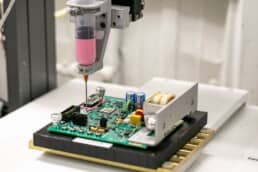
optimize processes. Efficiency, quality and cost-effectiveness are the rewards.
DATA-DRIVEN EXCELLENCE
Data is the lifeblood of RIS’s lean journey. Through meticulous data collection, Gemba walks and coworker feedback, RIS fine-tunes its processes. We base lean initiatives on concrete evidence.
Technology meets experience, resulting in a potent recipe for success.
THE TECHNOLOGICAL BACKBONE OF LEAN MANUFACTURING
Technology is the linchpin of lean manufacturing at RIS. The company invests in cutting-edge solutions that automate and optimize, ensuring that manufacturing is as efficient as possible.
FROM COBOTS TO 3D PRINTING: AUTOMATION IN ACTION
Discover how cobots, automated torque drivers, 3D printing and more are revolutionizing manufacturing at RIS. These technologies are more than just tools. They are the architects of lean efficiency.
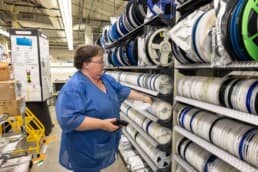
SMART SHELVING AND X-RAY COUNTERS: A SMART DUO
RIS’s smart shelving and X-ray counters work harmoniously to create an accurate inventory system, reducing waste and delays.
FEEDER LOW SYSTEMS AND 3D AOI: STREAMLINING OPERATIONS
Rather than inspecting every board indiscriminately, the 3D AOI system separates those that fail initial inspections. This allows us to utilize the touch only failed units methodology in our printed circuit board assembly. In doing
so, we optimize our resources and reduce inspection time without compromising the thoroughness of our quality processes.
We also implemented a piece of software that alerts our machine operators when a component reel is getting low. This way, the new reel can be ready and waiting when they need to make the switch.
With these efficiencies and more RIS minimizes downtime and maximizes quality.
QUALITY CONTROL THROUGH INNOVATION
RIS employs advanced quality control technologies. We use laser marking and test development to uphold the highest standards of quality and efficiency. Our commitment to innovation extends to our quality control tools and methods.
Smart Solutions:
We have integrated a smart torque driver into our quality control processes. This driver features built-in error-checking capabilities that reduce defects and ensure correct torquing of specialized hardware.
It can be programmed with the precise sequencing and torque settings required for the task. It will automatically flag any deviations from the prescribed order or torque range. This helps to eliminate defects related to missing hardware and guarantees that all components meet the required specifications.
LEAN MANUFACTURING PRINCIPLES IN ACTION
Discover how lean principles are driving efficiency, quality and success at RIS.
WASTE REDUCTION
At RIS, waste is not an option. We tackle common forms of waste, from waiting to over-processing, with lean strategies.
A cornerstone of our waste reduction efforts is the implementation of Poka-
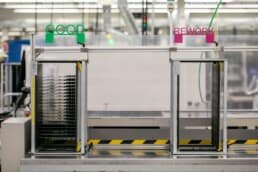
Yoke. This is a lean technique aimed at error-proofing processes. By systematically identifying and addressing potential sources of error, we proactively prevent defects and reduce rework.
This approach not only eliminates waste associated with defects but also enhances overall process efficiency.
A LEAN CULTURE IS EVERYONE’S RESPONSIBILITY
Lean isn’t just a process; it’s a culture at RIS. We empower all our staff to contribute to our culture of continuous improvement.
At RIS, pursuing quality and lean excellence is a journey powered by innovation and technology. From automation to a lean culture, manufacturing excellence is our daily commitment.
Our story is a testament to the power of relentless commitment to excellence and the transformative potential of technology in modern manufacturing.
About RiverSide Integrated Solutions
RIS is an advanced contract manufacturer providing robust solutions in circuit board assembly and product assembly. We employ more than 350 people and provide services to OEMs worldwide. We operate two state-of-the-art manufacturing facilities within the US.
With all of the choices in contract manufacturers out there, we know it can be challenging to find someone who understands your business model and has your best intentions in mind. RIS has always proven to be a win-win-focused relationship.
As your one-stop shop, we have the capabilities, capacity, quality assurance standards and resources to support all of your manufacturing needs. We understand that supply chain management is complex and very time-consuming, so we urge our customers to utilize us in the fullest capacity.
Our total-package solutions include:
- Extensive supply-chain network
- Full box-build assembly
- Dedicated Program Team
- Warehousing, kitting and drop-shipping capabilities
- Reverse logistics
- Flexible order fulfillment
- Scalability to meet your needs
Contact us today at (507) 523-3220 to see how we can help with your manufacturing project, or click contact us for a quote.
Cell Assembly vs. Assembly Lines: Making the Right Choice for Your Product
For original equipment manufacturers (OEMs), deciding whether to use cell assembly or assembly lines is crucial. It can determine the successfulness of their products. Choosing a too-costly method may make the product not profitable enough to last. On the other hand, selecting a manual process for a highly complex product could result in malfunctions. In this way, this decision can significantly affect production efficiency, product quality and cost-effectiveness.
At RiverSide Integrated Solutions (RIS), we determine which assembly method works best for each product we manufacture. We can help you delve into the complexities of both cell assembly and assembly lines. That way, you’re equipped with valuable insights to help you make an informed decision tailored to your manufacturing needs.
CELL ASSEMBLY
Cell assembly involves grouping workers into specialized cells responsible for assembling either a complete product or a subassembly. This approach is particularly effective when dealing with intricate or heavily customized products.
ADVANTAGES OF CELL ASSEMBLY
A significant advantage of utilizing cell assembly is its capability to quickly adapt to modifications in design or volume. This helps OEMs be more agile in the production process. This level of flexibility enables prompt
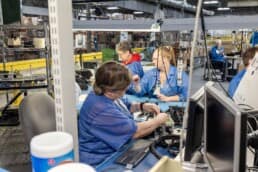
adjustments to meet the constantly evolving requirements of customers.
Moreover, cell assembly promotes specialization, enabling workers to concentrate on specific tasks and become proficient in their respective fields. This focused approach to assembly substantially enhances product quality by identifying and resolving potential defects and improving quality assurance.
DISADVANTAGES OF CELL ASSEMBLY
Although cell assembly has benefits, there are some things to remember. It requires a more significant upfront investment because specialized equipment and worker training are needed.
Furthermore, the output is usually lower compared to assembly lines. This is because workers in each cell are responsible for assembling a complete product or subassembly. It can impact production volume and efficiency, particularly during periods of high demand.
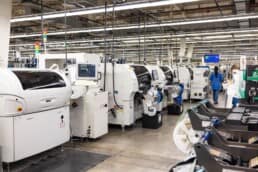
ASSEMBLY LINES
On the other hand, manufacturers use assembly lines for products with lower complexity. These products are ideal for conveyor belts, where each worker is assigned a specific task. This method is most effective for more straightforward products or high-volume production.
ADVANTAGES OF ASSEMBLY LINES
Assembly lines are known for their impressive output capacity. The constant flow of products along the line allows for a much higher volume of units.
Additionally, assembly lines require a lower initial investment as they need less specialized equipment and worker training. This makes them an attractive option for businesses with budget constraints. Assembly lines are also spatially efficient, taking up less room than cell assembly. This means the saved space can be used for other purposes or to expand production capacity.
DISADVANTAGES OF ASSEMBLY LINES
Although assembly lines are efficient, they have certain limitations. Cell assembly provides greater flexibility compared to assembly lines.
However, reconfiguring the assembly line to adjust for changes in design or volume can be complex. The process may impede quick responses to fluctuations in market demands or product variations.
Additionally, repetitive tasks within assembly lines may lead to worker boredom and reduced attention to detail. Both of these things increase the likelihood of defects and impact product quality.
DETERMINING THE RIGHT METHOD FOR YOU
At RIS, we utilize both cell assembly and assembly lines to provide tailored solutions for our customers. To determine the best option for your needs, we suggest considering the following factors:
- Complexity of Your Product: Our cell assembly services offer the flexibility and specialized expertise to meet requirements for your complex or customized product.
- Volume of Production: Our assembly line services offer streamlined efficiency and cost-effective solutions for high-volume production.
And, of course, when in doubt, consult with experienced manufacturing engineers, like the ones we have at RIS!
The most effective way to choose between cell assembly and assembly lines is to consult our experienced manufacturing engineers. You can access our extensive manufacturing services and expertise by partnering with RIS. Our dedicated team will collaborate closely with you. We assess needs, recommend optimal assembly methods and ensure efficient, high-quality results.
Choose RIS for customized manufacturing solutions that drive your product’s success.
About RiverSide Integrated Solutions
RIS is an advanced contract manufacturer providing robust solutions in circuit board assembly and product assembly. We employ more than 350 people and provide services to OEMs worldwide. We operate two state-of-the-art manufacturing facilities within the US.
With all of the choices in contract manufacturers out there, we know it can be challenging to find someone who understands your business model and has your best intentions in mind. RIS has always proven to be a win-win-focused relationship.
As your one-stop shop, we have the capabilities, capacity, quality assurance standards and resources to support all of your manufacturing needs. We understand that supply chain management is complex and very time-consuming, so we urge our customers to utilize us in the fullest capacity.
Our total-package solutions include:
- Extensive supply-chain network
- Full box-build assembly
- Dedicated Program Team
- Warehousing, kitting and drop-shipping capabilities
- Reverse logistics
- Flexible order fulfillment
- Scalability to meet your needs
Contact us today at (507) 523-3220 to see how we can help with your manufacturing project, or click contact us for a quote.
Assembly Testing: Ensuring Quality and Functionality
In today’s competitive marketplace, product quality is paramount. Thorough assembly testing is vital in ensuring that your products meet the highest standards.
At RiverSide Integrated Solutions (RIS), we understand the significance of product testing and offer a comprehensive range of services. With our experienced team and advanced equipment, we are committed to helping you achieve superior product quality and functionality.
Our Testing Processes
Our testing process begins with a thorough analysis of your product requirements. We work directly with our customers to identify the specific tests necessary to ensure your product’s quality and functionality. Once the tests have been identified, we develop a customized test plan and execute the tests on your product.
We offer a variety of testing methods, including:
3D Automated optical inspection (AOI)
A 3D AOI machine inspects a printed circuit board assembly (PCBA) for defects, including missing components, incorrectly placed components, solder defects and bridging during the assembly process. This is a quick and accurate method for identifying defects that may not be visible to the naked eye.
Flying probe testing
Flying probe testing is a highly effective method for testing low–volume
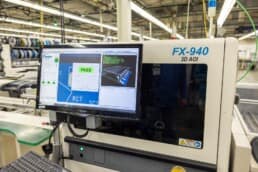
production, prototypes and boards with limited accessibility. It involves using a probe to test the surface of a PCBA for continuity, shorts, opens and other defects.
In-circuit testing
In-circuit testing stimulates the electrical connections on a PCBA to verify the proper functioning of all components. This comprehensive method allows us to test for a wide range of defects, surpassing the capabilities of flying probe testing.
Manufacturing defect analysis
Manufacturing defect analysis (MDA) involves a meticulous inspection of a PCBA. It can identify manufacturing defects, such as misapplied solder, missing components or incorrectly placed components. It is instrumental in preventing similar defects in the future.
Functional Testing
Functional testing simulates the real-world environment in which your product will be used. It evaluates performance, user interface and interaction with other systems. This ensures that your product meets functionality requirements.
Environmental Stress Screening or Burn-In test
Like functional testing, environmental stress screening (ESS) and burn-in testing subject a product to specific conditions. In these cases, those conditions are taken to the extreme to stress test a product’s reliability. These testing conditions include temperature, humidity and vibration. It is a valuable tool for identifying potential weak points in your product.
Why Choose RIS for Testing?
Experienced Team of Engineers
Our dedicated engineers possess extensive knowledge of testing techniques and standards. They are committed to providing you with the highest quality testing services.
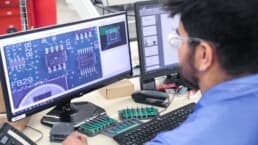
Wide Range of Testing Equipment
Our diverse range of equipment includes flying probe testers, in-circuit testers and functional testers. This allows us to test your product for a wide variety of defects.
Custom Test Solutions
We understand that every product has unique testing requirements. Our ability to develop custom test solutions ensures maximum effectiveness tailored to your specific needs.
Fast Turnaround Times
We value your time and strive to provide prompt service. Our fast turnaround times on testing ensure timely results, helping you meet your production schedules.
Additional Information
In addition to the listed testing services, we also offer the following:
Rework Services
If your product fails testing, we provide rework services to fix the defects and get your product back into production.
Failure Analysis
In the event of product failure, we help identify the cause to prevent future failures.
Test Data Analysis
We generate comprehensive reports and analyze the data to identify trends or areas for improvement.
Reliability Testing
We assess the reliability and durability of your product to ensure it meets the expected lifespan and performance requirements.
Certification Testing
Our expertise in certification testing helps us guide you through obtaining industry-standard certifications and expanding market reach.
When it comes to assembly testing, RIS is your reliable and experienced partner. We are dedicated to ensuring the quality and functionality of your products through our comprehensive testing services.
Contact us today to learn more about how we can assist you in meeting your testing needs and achieving superior product quality. Together, let’s make your products shine in the competitive marketplace.
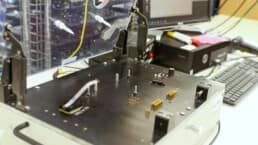
About RiverSide Integrated Solutions
RIS is an advanced contract manufacturer providing robust solutions in circuit board assembly and product assembly. We employ more than 350 people and provide services to OEMs worldwide. We operate two state-of-the-art manufacturing facilities within the US.
With all of the choices in contract manufacturers out there, we know it can be challenging to find someone who understands your business model and has your best intentions in mind. RIS has always proven to be a win-win-focused relationship.
As your one-stop shop, we have the capabilities, capacity, quality assurance standards and resources to support all of your manufacturing needs. We understand that supply chain management is complex and very time-consuming, so we urge our customers to utilize us in the fullest capacity.
Our total-package solutions include:
- Extensive supply-chain network
- Full box-build assembly
- Dedicated Program Team
- Warehousing, kitting and drop-shipping capabilities
- Reverse logistics
- Flexible order fulfillment
- Scalability to meet your needs
Contact us today at (507) 523-3220 to see how we can help with your manufacturing project, or click contact us for a quote.
Potting and Coating: A Cost-Effective Way to Protect Your PCBs
Printed circuit boards (PCBs) are essential components in a wide range of electronic devices. They provide the foundation for electrical connections between components. However, PCBs are also susceptible to a number of environmental factors, including moisture, heat and vibration. These factors can cause PCBs to fail, which can lead to costly repairs or even the complete failure of an electronic device. Potting and coating are two methods that can be used to protect PCBs from environmental damage, often referred to jointly as ruggedization.
Potting or encasement involves encasing the PCB in a protective resin, while conformal coating involves applying a thin layer of protective material to the surface of the PCB. Both potting and coating can provide a number of benefits in terms of PCB protection.
Potting vs. Conformal Coating
Potting offers a number of advantages over conformal coating. First, potting provides a more complete barrier against environmental factors. The resin can completely encapsulate the PCB, which helps to prevent moisture, heat and vibration from reaching the components. Second, potting can help to dissipate heat more effectively than coating. This is because the resin can conduct heat away from the components, which can help to prevent them from overheating. Finally, potting can help to protect the PCB from physical damage. The resin can act as a shock absorber, which can help to prevent the PCB from being damaged if it is dropped or otherwise subjected to physical force.
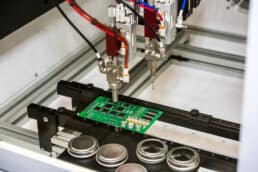
At the same time, conformal coating offers a number of its own advantages. First, coating is a less expensive option than potting. Second, coating is a more versatile option than potting. Coating can be applied to a variety of surfaces, including PCBs, metal parts and plastic parts. Third, coating can be used to provide a variety of finishes, including matte, gloss and metallic finishes.
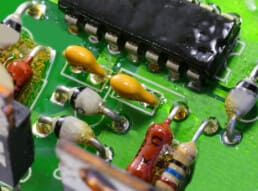
To decide whether an assembly needs conformal coating or potting to help protect it, you will need to consider a number of factors:
• Protection from environmental hazards:
Potting and coating can help to protect PCBs from moisture, dust and other contaminants. If an assembly will only ever be exposed to such materials residually, it may only need the comparatively thin conformal coating to protect it. But if the assembly is likely to be completely submerged in water, for example, it may need a potting solution to ensure the electrical components are completely protected.
• Protection from physical damage:
Potting and coating can also help to protect PCBs from physical damage, such as shock and vibration. Similarly, to environmental hazards, whether an assembly will need potting vs conformal coating will depend on how much physical force, such as shock or vibration, the PCB is likely to be exposed to. Potting will provide more comprehensive protection, while coating will offer a lighter-weight alternative for assemblies that won’t be as exposed to physical damage.
• Improved electrical performance:
Potting and coating can help to improve the electrical performance of PCBs by reducing noise and interference. This can be important in applications where the PCB is used in sensitive electronic equipment such as radios or other telecommunication equipment. Here potting will do a better job of completely isolating the electronic components, while coating is reserved for those that don’t need to be so thoroughly isolated.
For assemblies in need of serious protection, potting and coating are often used together to provide the best possible protection. You will need to carefully consider which of these protections, if any, your PCB will need. But that isn’t the only decision you’ll need to make. The type of potting or coating material your PCB needs will depend on the specific application.
Types of Potting and Coating Materials at RIS
There are a variety of potting and coating materials available, each with its own advantages and disadvantages. At RiverSide Integrated Solutions (RIS), we offer a variety of potting and coating services for PCBs. Types of materials used for potting and coating fall into one of two categories. Room Temperature Vulcanizing (RTV) compounds which, as the name implies, will cure at room temperature over a period of time. Often with RTVs, heat may be applied to expedite the curing process. The other type of compound used at RIS is thermosetting. These compounds will not cure without heat being applied as a catalyst for the curing process.
These include:
• Silicone
Silicone can be used for both conformal coating and potting. It is a polymer that is applied in a thin sheet as a liquid for conformal coating to the surface of the PCB or injected into a mold for potting. Although many silicones require either a heat or acid catalyst to cure, the silicone compounds used at RIS are RTV compounds.
• Urethane:
Urethane is a type of thermosetting resin that is often used for both potting and conformal coating. It is a polymer that is applied in a thin sheet as a liquid for conformal coating to the surface of the PCB or injected into a mold to fully encapsulate the assembly for potting. The urethane compounds used at RIS are RTV compounds.
• Epoxy resins:
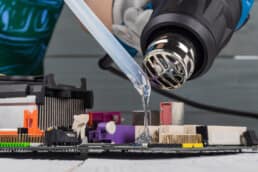
hardener. These are mixed together and then injected into a mold to create an encapsulation around a PCB for potting. Some epoxies can be thermosetting, but the epoxy compounds used at RIS are RTV compounds.
• Polyurethane resins:
Polyurethane resins are a type of resin that is often used for coating. Polyurethane is a polymer made up of two monomers, isocyanate and an alcohol. These are mixed together and then injected into a mold to create an encapsulation around a PCB for potting while many polyurethane compounds are thermosetting, the polyurethane compounds used at RIS are RTV compounds.
The Right Potting or Coating for Your Needs
The right potting or coating material for your needs will depend on a number of factors, including the environment in which the PCB will be used, the level of protection required and the cost. With so many choices and variations, it can be hard to know which compound and protection technique is the right combination for your assembly. That’s why we have a team of experienced engineers who can help you choose the right solution for your assembly.
Contact us today to learn more about manufacturing with RIS and see how we can help you protect your PCBs.
About RiverSide Integrated Solutions
RIS is an advanced contract manufacturer providing robust solutions in circuit board assembly and product assembly. We employ more than 350 people and provide services to OEMs worldwide. We operate two state-of-the-art manufacturing facilities within the US.
With all of the choices in contract manufacturers out there, we know it can be challenging to find someone who understands your business model and has your best intentions in mind. RIS has always proven to be a win-win-focused relationship.
As your one-stop shop, we have the capabilities, capacity, quality assurance standards and resources to support all of your manufacturing needs. We understand that supply chain management is complex and very time-consuming, so we urge our customers to utilize us in the fullest capacity.
Our total-package solutions include:
- Extensive supply-chain network
- Full box-build assembly
- Dedicated Program Team
- Warehousing, kitting and drop-shipping capabilities
- Reverse logistics
- Flexible order fulfillment
- Scalability to meet your needs
Contact us today at (507) 523-3220 to see how we can help with your manufacturing project, or click contact us for a quote.
How RiverSide Integrated Solutions Uses 3D Printing to Improve Efficiency and Quality
3D printing is a rapidly growing technology that is being used in a variety of industries, including manufacturing. RiverSide Integrated Solutions (RIS) is a company that is using 3D printing, or additive manufacturing, to improve the efficiency and quality of the product assembly process.
At RIS, we use the latest 3D printing technology to create one-of-a-kind solutions for our customers’ product assembly needs. We believe that 3D printing is a powerful tool that can help our customers improve their products and processes.
BENEFITS OF 3D PRINTING
Here are some of the benefits of using 3D printing for product assembly:
Increased flexibility:
3D printing allows for rapid prototyping and manufacturing of custom parts, which can help to improve product assembly efficiency and reduce costs.
Improved quality:
3D printing can be used to create complex parts with tight tolerances, which can help to improve the overall quality of assembled products.
Reduced lead times:
3D printing can help to reduce lead times for product assembly by eliminating the need for tooling and other traditional manufacturing
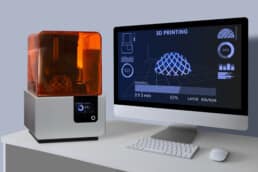
processes.
Increased sustainability:
3D printing can help to reduce waste and improve the sustainability of product assembly by using less material and energy than traditional manufacturing methods.
3D PRINTING SOLUTIONS AT RIS
We went to Rich Lieske, RIS’s engineering manager to get some real-life examples of how RIS is using 3D printing to make a difference in our customers’ experiences:
Custom pick-and-place trays:
We used to have to go to a third-party vendor to design and manufacture custom pick-and-place trays. This process was time-consuming and expensive. Now, we can design and print our own trays in-house overnight. This has saved us a significant amount of time and money.
Custom dispensing needles:
We were able to design and print a new dispensing needle for a product with large caps. The only commercially made nozzles that fit the size cap this product had was over $10, couldn’t be cleaned, was made of metal and required them to use high-pressure for dispensing due to the shape of the needle. They had to throw the needle away after every use. So one of our engineers designed their own needle with a tapered diameter which requires less pressure to dispense, and is made out of a cheap resin material. Now the company can print 50 to 100 of these needles at a time, so while they may not have been able to solve the problem of waste with this particular product, they at least solved the problem of cost.
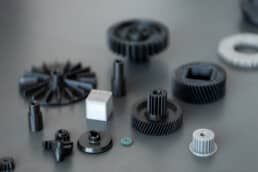
Custom tools and machine parts:
We use 3D printing to create custom tools and machine parts that can be worked into our assembly processes. This helps us to improve efficiency and quality.
Dual head 3D printing:
We use dual head 3D printing to create parts with multiple materials. This allows us to create parts with the desired properties for the specific application.
If you are looking for a way to improve the efficiency, quality and sustainability of your product assembly process, 3D printing is a great option to consider. RIS can help you to implement 3D printing into your manufacturing process and achieve the desired results.
Rich concludes by saying: “It was a huge advantage for us to start 3D printing.”
About RiverSide Integrated Solutions
RIS is an advanced contract manufacturer providing robust solutions in circuit board assembly and product assembly. We employ more than 350 people and provide services to OEMs worldwide. We operate two state-of-the-art manufacturing facilities within the US.
With all of the choices in contract manufacturers out there, we know it can be challenging to find someone who understands your business model and has your best intentions in mind. RIS has always proven to be a win-win-focused relationship.
As your one-stop shop, we have the capabilities, capacity, quality assurance standards and resources to support all of your manufacturing needs. We understand that supply chain management is complex and very time-consuming, so we urge our customers to utilize us in the fullest capacity.
Our total-package solutions include:
- Extensive supply-chain network
- Full box-build assembly
- Dedicated Program Team
- Warehousing, kitting and drop-shipping capabilities
- Reverse logistics
- Flexible order fulfillment
- Scalability to meet your needs
Contact us today at (507) 523-3220 to see how we can help with your manufacturing project, or click contact us for a quote.



